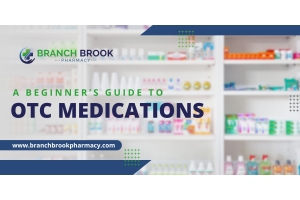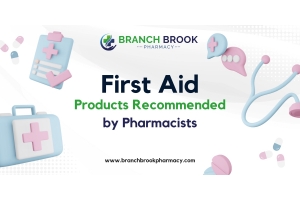Pain Relief Options: Over-the-Counter Medications Explained by Branch Brook Pharmacy

Pain is an uninvited guest that can crash into our lives, disrupting our daily routines. Whether it's a nagging headache, aching muscles, or the discomfort of arthritis, finding effective relief is essential. Fortunately, a wide range of over-the-counter pain relief medications are available to help alleviate these symptoms. In this comprehensive guide, Branch Brook Pharmacy will explore the different types of OTC pain relief options, their uses, and important considerations for safe and effective use.
Pain affects people of all ages and backgrounds. It can be a debilitating condition that significantly impacts one's quality of life. According to the National Institutes of Health (NIH), chronic pain affects an estimated 50 million adults in the United States alone. The economic burden of chronic pain is staggering, with an estimated annual cost of $635 billion in medical treatments and lost productivity. Despite the prevalence and impact of pain, many individuals struggle to find effective relief. Over-the-counter pain relief medications play a crucial role in managing mild to moderate pain, offering a convenient and accessible solution for those seeking relief. However, it's essential to understand the different types of OTC pain relievers, their uses, and potential side effects to ensure safe and effective use.
Understanding Your Pain
Before diving into the world of over-the-counter medications, it's crucial to understand the nature of your pain. Is it sharp, dull, throbbing, or constant? Where is the pain located? Knowing the type and location of your pain can help you choose the most appropriate pain relief option.
There are generally two main categories of over-the-counter pain relief medications:
- Acetaminophen: This medication is effective for relieving mild to moderate pain and fever. It works by lessens pain signals sent to the brain. Popular brands include Tylenol and Paracetamol. Acetaminophen is generally gentle on the stomach but should be used with caution in individuals with liver disease.
- Nonsteroidal Anti-Inflammatory Drugs (NSAIDs): NSAIDs tackle both pain and inflammation. They are often preferred for conditions like arthritis, menstrual cramps, and muscle aches. Popular NSAID options include ibuprofen (available as Advil or Motrin), naproxen (marketed as Aleve), and aspirin. While effective, NSAIDs can irritate the stomach lining and increase the risk of heart problems and stroke, especially with long-term use.
Choosing the Right Over-the-Counter Pain Reliever

Selecting the right over-the-counter pain relief medication depends on several factors:
- Type of pain: For mild to moderate pain and fever, acetaminophen is often a good starting point. If you're experiencing inflammation, an NSAID may be more suitable.
- Severity of pain: For mild discomfort, over-the-counter options may suffice. However, for severe or persistent pain, consult your doctor for prescription pain relievers.
- Medical conditions: Individuals with certain medical conditions, such as liver or kidney disease, should consult their healthcare provider before taking over-the-counter medications.
- Other medications: Some over-the-counter pain relievers may interact with other medications you're taking. Always check with your pharmacist before combining medications.
Common Over-the-Counter Pain Relief Medications
Let's delve deeper into the most common over-the-counter pain relief medications available at Branch Brook Pharmacy:
-
Acetaminophen:
- Relieves pain and fever
- Gentle on the stomach
- Maximum daily dosage should not be exceeded
-
Ibuprofen:
- Reduces pain, fever, and inflammation
- Can cause stomach upset
- Not recommended for people with ulcers or bleeding disorders
-
Naproxen:
- Longer-lasting pain relief than ibuprofen
- Can increase the risk of heart problems and stroke
- Consult your doctor if you have heart or kidney disease
- Aspirin:
- Reduces pain, fever, and inflammation
- Low-dose aspirin therapy can help safeguard against heart attacks and strokes.
- Children should not take aspirin, as it can increase their risk of developing Reye's syndrome, a potentially life-threatening illness.
Tips for Safe and Effective Use of Over-the-Counter Pain Relief Medications
To maximize the benefits and minimize the risks of over-the-counter pain relief medications, follow these guidelines:
- Read the label carefully: Understand the active ingredients, dosage, and potential side effects.
- Follow directions: Adhere to the recommended dosage and frequency.
- Avoid combining medications: Unless advised by your doctor or pharmacist, avoid taking multiple pain relief medications simultaneously.
- Stay vigilant for side effects: Monitor your health and seek medical help if you notice any unexpected or worrisome reactions.
- Consult your pharmacist: Branch Brook Pharmacy's knowledgeable pharmacists can provide personalized advice on choosing the right over-the-counter pain relief medication for your needs.
When to Seek Medical Attention
While over-the-counter pain relief medications are effective for many types of pain, there are situations where it's essential to consult a healthcare professional:
- Severe or persistent pain: If your pain is intense, worsening, or doesn't improve with over-the-counter medications, seek medical attention.
- Pain accompanied by other symptoms: If your pain is accompanied by fever, rash, difficulty breathing, or other concerning symptoms, consult a doctor.
- Chronic pain conditions: If you have a chronic pain condition, work with your healthcare provider to develop a comprehensive pain management plan.
Over-the-counter pain relief medications can provide effective relief for a variety of aches and pains. By understanding the different types of medications, their uses, and potential side effects, you can make informed decisions about your pain management. Remember, Branch Brook Pharmacy is here to assist you in selecting the right product and answering any questions you may have. Your health and well-being are our top priorities.
In addition to over-the-counter pain relief medications, there are other natural and complementary therapies that can help alleviate pain. These include:
- Topical pain relievers: Creams, gels, and ointments containing ingredients like menthol, capsaicin, or lidocaine can provide targeted relief for muscle and joint pain. They are applied directly to the affected area and can be used in conjunction with oral pain relievers.
- Heat and cold therapy: Applying heat or cold to the affected area can help reduce pain and inflammation. Heat therapy, such as warm baths or heating pads, can help relax muscles and improve blood flow. Cold therapy, like ice packs or cold compresses, can numb pain and reduce swelling.
- Massage: Regular massage therapy can help relieve muscle tension, improve circulation, and promote relaxation, which can lead to reduced pain levels. Massage may be particularly beneficial for conditions like chronic back pain, neck pain, and headaches.
- Acupuncture: An ancient Chinese technique, involves the strategic insertion of fine needles into precise bodily points to restore balance, stimulate energy flow, and foster natural healing processes. Acupuncture has been shown to be effective in treating various types of pain, including headaches, neck pain, and osteoarthritis.
While these complementary therapies can be helpful in managing pain, it's important to consult with a healthcare professional before starting any new treatment regimen. They can provide guidance on the most appropriate and safe options based on your individual needs and medical history.
Also Read: Supporting Healthy Lifestyles: Vitamins and Supplements
Conclusion
over-the-counter pain relief medications can be a valuable tool in managing mild to moderate pain. By understanding the different types of medications, their uses, and potential side effects, you can make informed decisions about your pain management. Remember to always follow the instructions on the label, avoid combining medications unless advised by a healthcare professional, and consult with your pharmacist or doctor if you have any concerns or questions. With the right approach and support from the team at Branch Brook Pharmacy, you can find effective relief and improve your overall quality of life.










